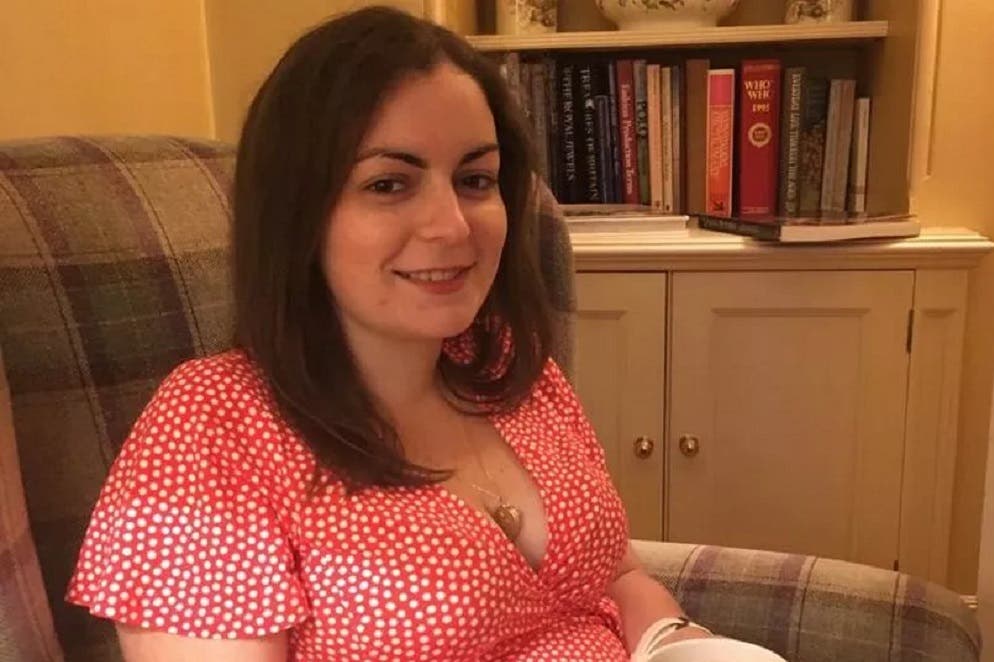Mother died in childbirth after seeing newborn son for seconds, inquest hears
A three-day inquest into the death of Bernadette Horsey, 31, began on Wednesday.

A new mother who died in childbirth suffered a “profound, catastrophic collapse” which could not have been prevented, an inquest has heard.
Bernadette Horsey saw her newborn son, Tim, for just a few seconds before entering cardiac arrest and dying at the Royal Derby Hospital on January 19 2022.
At an inquest into the 31-year-old’s death, which began on Wednesday, Derby Coroner’s Court heard there was a “clear and critical change” in Mrs Horsey’s health within the space of 60 seconds.
Dr Martyn Traves, a consultant anaesthetist at the University Hospitals of Derby and Burton NHS Foundation Trust (UHDB), which runs the hospital, said he believed Mrs Horsey died from an amniotic fluid embolism, where amniotic fluid enters the bloodstream and causes a reaction which can stop the heart.
In about 60 seconds we went from relative normality to a catastrophic position
He said: “All diseases have spectrums. Some people have different reactions to it and in this case, it was a profound, catastrophic collapse.
“There was no way of predicting that.
“In about 60 seconds we went from relative normality to a catastrophic position.
“I am certain that this was an amniotic fluid embolism.”
When asked by Louise Pinder, assistant coroner for Derby and Derbyshire, whether there were any missed opportunities to save Mrs Horsey, Dr Traves replied: “Not as far as I’m aware of.
“We reacted quickly to what was happening in front of us.
“Sadly, I don’t think we could have done anything to change that.”
Dr Traves, who anaesthetised Mrs Horsey ahead of her planned caesarean section and was present during the operation to deliver Tim, said there were no concerns over her health until seconds before she entered cardiac arrest.
He told the court that immediately following Tim’s delivery, he went to inject Mrs Horsey’s hand with oxytocin, as was routine, but he noticed her hand was in an unexpected position.
He said this was not abnormal, but he said he paused the injection when Mrs Horsey continued to move unexpectedly.
At this point, he noticed that her face was “extremely pale and mottled” and that her eyes had rolled back, representing a “clear and critical change” in her condition.
It was extremely evident that she was in a critically unwell position at that time
He declared she had become tonic, meaning her body had entered a seizure, just seconds after he had congratulated Mrs Horsey on the birth of her son.
He said: “It was extremely evident that she was in a critically unwell position at that time.
“It was not obvious what had occurred.”
Despite the best efforts of staff, Mrs Horsey was declared dead at 11.45am. Tim survived.
Dr Traves added that the injection of oxytocin would not have contributed to the reaction caused by the embolism.
The death of Mrs Horsey was one of three maternal deaths and four maternal collapses at the Royal Derby in the space of 16 months.
In a report issued in February this year, the Health and Safety Investigation Branch said that while there were no common themes, incidents could have been prevented had previous advice been implemented.
The HSIB also made two urgent safety recommendations.
Mrs Horsey, a biomedical scientist who worked for the Nottingham University Hospitals NHS Trust, was born in Kent and lived in Beeston, near Nottingham.
Giving his evidence, her widower, Aaron, said that his wife gained weight, suffered from “debilitating” morning sickness and suffered swelling and chest pain at points throughout her pregnancy.
However, these were deemed to be normal and the couple travelled to the hospital for a planned caesarean section on the morning of January 19.
He said that before entering the hospital, Mrs Horsey said she was “scared of what was about to happen”, and was specifically concerned “about having a blood clot and dying suddenly”, but had no concerns about the care given at the time.
I could not even process what was happening. It was just like this image does not make sense
He said: “The screen was lowered and he (Tim) was just there. She (Mrs Horsey) said ‘It’s a boy’.
“It could have been 100 years we were looking at Tim. Then the screen was put back up again.
“As I turned back from the screen to look at her, I let her head down on the pillow and as soon as I took my hand out she just slumped towards me.
“I could not even process what was happening. It was just like this image does not make sense.”
The inquest, expected to conclude on Friday, continues.